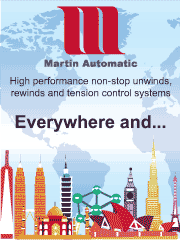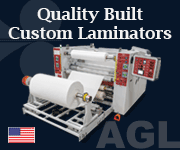Harmonic System Gets Tension Under Control
- Published: November 01, 2001, By Edward Boyle, Contributing Editor
Family-owned Capital Printing, based in Fairfield, NJ, serves its growing customer base the old-fashioned way, reports president and founder Vijay Patel: “We offer quick turnaround, our prices are competitive, and our quality is very good. Once we get a chance to do a job, our chances of keeping a customer are very good.”
And speaking of chances, Patel adds that the 14-year-old label company has seen its chances of capturing new business in the highly competitive four-color process market greatly improve — along with print quality — with the recent installation of a Conic harmonic differential tension control system from Nireco America Corp.
The unit was installed on a six-color, 7-in., ultraviolet Flexomaster 3 press from Allied Gear. This is the press that launched the roll side of the business in 1992. (The company operated as a sheet-fed, offset-only facility for its first five years.)
Much of Capital Printing's label work traditionally has been in the pharmaceutical and packaging insert markets, with run lengths averaging between 5,000 and 100,000 labels. Prior to Nireco America's installation of the Conic right-angle harmonic differentials and its Series 3177 digital tension control system, Capital's ability to print four-color process labels was limited due to intermittent registration problems that reduced print quality and greatly increased waste. The new Nireco infrared tension system changed all that, reports Patel.
Patel notes the nine-year-old Allied Gear press originally was equipped with tension controls only on the unwind station, which tended to generate a lot of movement between print units. Even constant monitoring by press operators could not reduce waste much below 25% on four-color process jobs.
“Before we put in the Nireco tension control, the web was jumping from station to station,” explains Patel, “so the first station would match up with the fourth station and the second would match up with the fifth. We were constantly trying to move [the web] around and set it, but we still had movement throughout the run.”
Patel says the installation of Nireco's infeed system eliminated that movement — and the resulting waste — by maintaining tension throughout the run, even between print stations. “Now it doesn't move at all. We can leave the press alone. Once the job is set, it stays there.”
Tension Control is Key to System
The centerpiece of Nireco's system is its Series 3177 digital tension control system that works in conjunction with the Conic phase-shifting and speed-correcting right-angle harmonic differentials. The tension control system comprises a microprocessor that combines with a dedicated signal processor to provide a simple and reliable method of adjusting and controlling web tension to 32-bit accuracy, according to Patel.
Integrated into the unit is a full-range, four-quadrant-speed controller with permanent magnet trim shaft motors that are rated to 2 hp. A remote-mounted control station allows Capital's press operators to preset and control web speed. Each station includes status indicators, command set-point adjustment, tension set-point indication, and a slack web take-up control.
The high-precision harmonic drive that actually controls web tension on the press reportedly provides zero backlash and high torque using hardened and lapped spiral bevel gears, reports Patel. It provides 360-deg running register adjustment and high over-hung load capabilities.
The Nireco differentials have helped Patel reduce waste to about 5%. The resulting cost savings, combined with the improved print quality, has allowed Capital to pursue label accounts it would never have approached prior to installation of the Nireco system, such as neutraceuticals.
“In pharmaceuticals, generic prescription labels don't need a lot of fancy printing,” Patel says. “It's mostly spot colors, and registration isn't as big a concern as when you're doing four-color process. With neutraceuticals, cosmetically they have to look different, more attractive, and we've been able to hold registration very well now and deliver the look the customer wants.”
Capital runs substrates from Fasson and uses inks from Environmental Inks & Coatings.
Patel says he first became aware of the Nireco system at a trade show last year. Once he expressed an interest in learning more about how harmonic differentials could help Capital improve quality on its full-UV press, Nireco technicians visited Patel's facility to determine exactly which of its units would work best to solve registration problems on the nine-year-old press.
“I was impressed with their customer response,” says Patel. “They came to me to figure out what I needed, then they installed the system and made sure it was really what I needed to solve my registration problem. Another company might not have gotten so involved with a small company like ours.”
With his registration problem solved, Patel says he also has begun pursuing ISO-9000 registration to better position Capital Printing as a supplier to the demanding pharmaceutical market. He expects to be certified by the end of this year.
Patel reports he is so pleased with the improved quality provided by the Nireco harmonic differentials — and the subsequent increase in potential business that it, along with ISO certification, should bring — that he may add a second press to his operation for the first time next year.
“It all depends on how strongly I market our new capabilities. With the improved quality we've achieved, thanks to the Nireco America system, it should be easier to approach new markets and new customers.”
SUPPLIER INFORMATION
Nireco America Corp.Port Jervis, NY; 914/856-4053; nireco-web.com.
Allied Gear & MachineSt. Louis, MO; 314/991-5900; 800/896-1989
Fasson Films/Avery Dennison Painesville, OH; 216/639-3000; 800/828-0122; averydennison.com
Environmental Inks & Coatings Corp.Morganton, NC; 828/433-1922; 800/ENVINKS; envinks.com
CONVERTER CONNECTION
Capital Printing Fairfield, NJ; 973/227-7122













